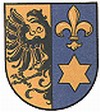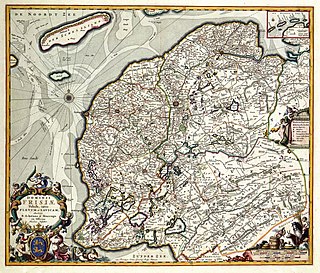
het Bildt is a former municipality in the province of Friesland in the northern Netherlands; its capital was Sint Annaparochie. The population was data missing in 2021. On 1 January 2018 it merged with the municipalities of Franekeradeel, Menameradiel and parts of Littenseradiel to form the new municipality Waadhoeke.

Podestà, also potestate or podesta in English, was the name given to the holder of the highest civil office in the government of the cities of Central and Northern Italy during the Late Middle Ages. Sometimes, it meant the chief magistrate of a city-state, the counterpart to similar positions in other cities that went by other names, e.g. rettori ("rectors").

Juw Dekema was a Frisian chieftain and Schieringer in Weidum and Baard, who was elected as potestate of Friesland in 1494 at the diet of Sneek. In 1498 he asked Albrecht of Saxony to rule the land. Juw served as a councilor at the Court of Friesland (1500–1515) and magistrate of Baarderadeel (1510–1512).
The Friso-Hollandic Wars, also called Frisian-Hollandic Wars, were a series of short medieval wars consisting of the attempts made by the counts of Holland to conquer the free Frisian territories, which lay to the north and east of their domain. These wars were waged off and on from 1256 to 1297, 1324 to 1348, 1396 to 1411, and from 1421 to 1422, although it could be argued that a state of war continued to exist between the County of Holland and the Frisian territories till well after the year 1500.

Ygo Gales Galama was a 15th-century Frisian warlord and Galama-patriarch.
Haring Harinxma (1323–1404) was a powerful Frisian chieftain and Schieringer who lived during the 13th and early 14th centuries. Haring also used the surname Donia, and is considered the patriarch of this well known Frisian family. Another title used by Haring was thoe Heeg meaning 'of Heeg', where he was born and lived.
Jancko Douwama was a Frisian nobleman who fought to free Friesland from foreign rule during the Vetkopers and Schieringers conflict, the Saxon feud and the Guelders Wars.
Wijerd Jelckama was a Frisian military commander, warlord and member of the Arumer Zwarte Hoop. He was the lieutenant of Pier Gerlofs Donia and fought along his side against the Saxon and Hollandic invaders. Jelckama took Donia's place as freedom fighter after Donia retired in 1519.

The Vetkopers and Schieringers were two opposing Frisian factional parties from the medieval period. They were responsible for a civil war that lasted for over a century (1350–1498) and which eventually led to the end of the so-called "Frisian freedom".
Adelbrik Adelen was the third potestaat of Friesland a province of the Netherlands.
Hessel Martena was the tenth Potestaat of Frisia. He succeeded Reinier Camminga.

Magnus Forteman (809) was the legendary first potestaat and commander of Frisia which is now part of Germany and the Netherlands. His existence is based on a sage's writings.

Igo Galama was the legendary fifth potestaat of Friesland, now a province of the Netherlands. There is no evidence that he existed.
Sjoerd Pijbes Wiarda was the fifteenth potestaat of Friesland now a province of the Netherlands.

Frisian freedom was the absence of feudalism and serfdom in Frisia, the area that was originally inhabited by the Frisians. Historical Frisia included the modern provinces of Friesland and Groningen, and the area of West Friesland, in the Netherlands, and East Friesland in Germany. During the period of Frisian freedom the area did not have a sovereign lord who owned and administered the land. The freedom of the Frisians developed in the context of ongoing disputes over the rights of local nobility.
Hessel Hermana is the fourth potestaat of Friesland in the list of rulers of Frisia. Supposedly from Sexbierum, he does not appear in historical sources until the late 16th century.

Focko Ukena was an East Frisian chieftain (hovetling) who played an important part in the struggle between the Vetkopers and Schieringers in the provinces of Groningen and Friesland. Aside from this he was one of the leading figures in the resistance against the forts of stately authority in East-Frisia of the tom Brok family.

Edzard I, also Edzard the Great was count of East Frisia from 1491 until his death in 1528.

The Lordship of Frisia or Lordship of Friesland was a feudal dominion in the Netherlands. It was formed in 1498 by King Maximilian I and reformed in 1524 when Emperor Charles V conquered Frisia.








